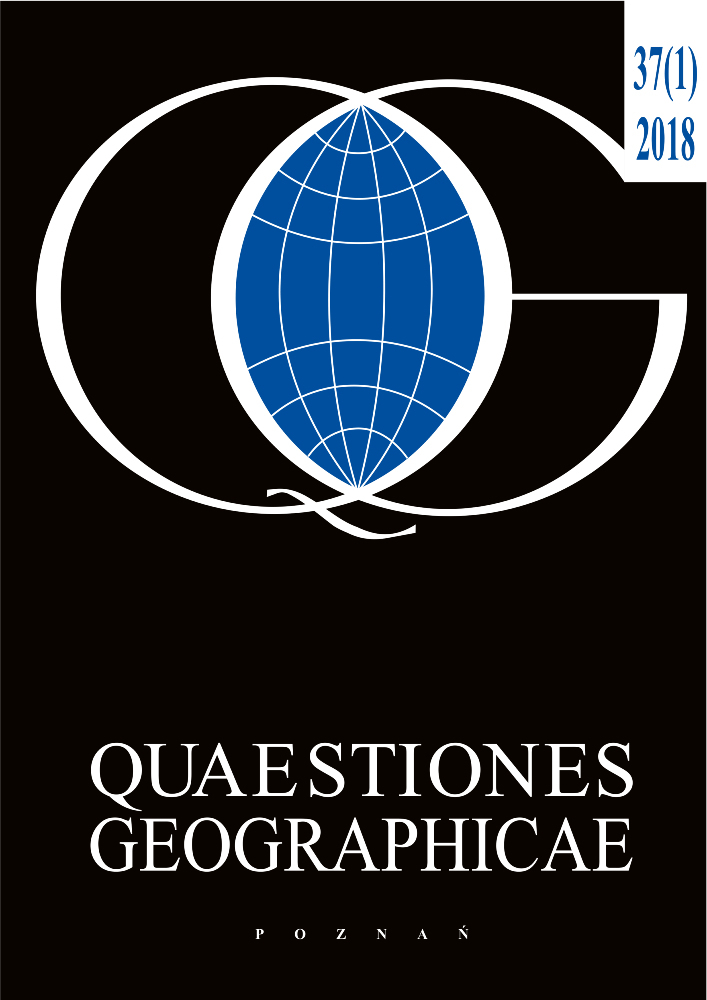Abstract
The aim of the article is to get a closer overview of the non-instructional methods of the teaching-learning process of geography. To achieve this goal, the results of the international project Borderland: Border Landscapes Across Europe(undertaken in 2012 and 2013, within the framework of LLP-Erasmus Programme) was presented. Special attention was paid on the innovative approach to learning methods, namely learning by doing (LBD) that was experienced in a multinational environment during the project’s implementation.
References
Barrows H.S., 1996. Problem-Based Learning in Medicine and Beyond. New Direction for Teaching & Learning 68: 3–12. DOI: 10.1002/tl.37219966804.
Biggs J.B., Tang C., 2011. Teaching for quality learning at university. What the students does, 4th edition. Open University press, Society for research into Higher Education, Berkshire.
Boud D, Feletti G., 1997. Changing Problem-Based Learning. Introduction to the Second Edition. In: Boud D., Feletti G. (eds), The Challenge of Problem-Based Learning, 2nd Edition. Kogan Page, London.
Boud D., Keogh R., Walker D., 1985. Reflection: Turning experience into learning. Kogan Page, London.
Breunig M.C., 2005. Turning experiential education and critical pedagogy theory into praxis. Journal of Experiential Education 28(2): 106–122. DOI: 10.1177/1053825917690870.
Breunig M.C., 2009. Teaching Dewey’s experience and education experientially. In Stremba B., Bisson Ch.A. (eds), Teaching Adventure Education Theory: Best Practices. Human Kinetics.
Dewey J., 1938. Experience and education. Macmillan, New York.
Duch B.J., Groh S.E., Allen D.E., 2001. Why Problem-Based Learning? a Case Study of Institutional Change in Undergraduate Education. In: Duch B.J., Groch S.E., Allen D.E., (eds), The Power of the Problem-Based Learning. A Practical „How to” for Teaching Undergraduate Courses in any Discipline. Stylus Publishing, Sterling, Virginia: 3–12.
Gibbs G., 1992. Improving the quality of student learning. Technical and Educational Services Ltd., Bristol.
Gibbs G., 1999. Using assessment strategically to change the way students learn. In: Brown S., Glasner A., (eds), Assessment Matters in Higher Education. Society for research into Higher Education and open University press, Maid-enhead: 41–53.
Hawley D., 1992. Building Conceptual Understanding in Young Scientists. Journal of Geosciences Education 50(4): 363–371. DOI: 10.5408/1089-9995-50.4.363.
Hmelo-Silver C.E., Barrows H.S., 2006. Goals and Strategies of a Problem-Based Learning Facilitator. Interdisciplinary Journal of Problem-Based Learning 1(1): 21–39. DOI: 10.7771/1541-5015.1004.
Hussain I., 2012. Use of Constructivist Approach in Higher Education: An Instructors’ Observation. Creative Education 3(2): 179–184. DOI: 10.4236/ce.2012.32028.
Jonassen D., 1991. Objectivism vs. constructivism. Do we need a new philosophical paradigm? Educational Technology Research and Development 39(3): 5–14. DOI: 10.1007/BF02296434.
Knapp C., 1992. Lasting lessons: A teacher’s guide to reflecting on experience. WY: ERIC Clearinghouse on Rural Education and Small Schools. Charleston.
Kolb D., Fry R. 1975. Toward an applied theory of experiential learning. In: Cooper C. (eds), Studies of group process. Wiley, New York: 33–57.
Lambert D., 2014. Subject teachers in knowledge-led schools. In: Young M., Lambert D., Roberts C., Roberts M., (eds), Knowledge and the future school: curriculum and social justice, Bloomsbury Publication, London.
Markuszewska I., Tanskanen M., Vila Subirós J., 2016. Boundaries from borders: Cross-border relationships in the context of the mental perception of a borderland – experiences from Spanish–French and Polish–German border twin towns. Quaestiones Geographicae 35(1): 105–119. DOI: 10.1515/quageo-2016-0010.
Roberts T., 2006. A philosophical examination of experiential learning theory for agricultural educators. Journal of Agricultural Education 47(1): 17–29. DOI: 10.5032/jae.2006.01017.
Schmidt H.G., 1983. Problem-based learning: Rationale and description. Medical Education 17: 11–16. DOI: 10.1111/j.1365-2923.1983.tb01086.x.
Steffe L., Gale J., 1995. Constructivism in education. Hillsdale, Lawrence Erlbaum Associates, New York.
Stringer E.T., Christensen L., Baldwin S.C., 2010. Integrating Teaching, Learning, and Action Research: Enhancing Instruction. SAGE Publications, Inc.
Yew E.H.J., Schmidt H.G., 2012. What students learn in Problem-Based Learning: a process analysis. Instructional Science 40(2): 371–395. DOI: 10.1007/s11251-011-9181-6.
Young M., 2014. Knowledge, curriculum and the future school. In: Young M., Lambert D., Roberts C., Roberts M., (eds), Knowledge and the future school: curriculum and social justice, Bloomsbury Publication, London.
Wijnia L., Loyens S.M.M., Derous E., Schmidt H.G., 2015. How important are student-selected versus instructor-selected Resources for Student’s Learning and Motivation in Based –Problem Learning? Instructional Science 43(1): 39–58. DOI: 10.1007/s11251-014-9325-6.
